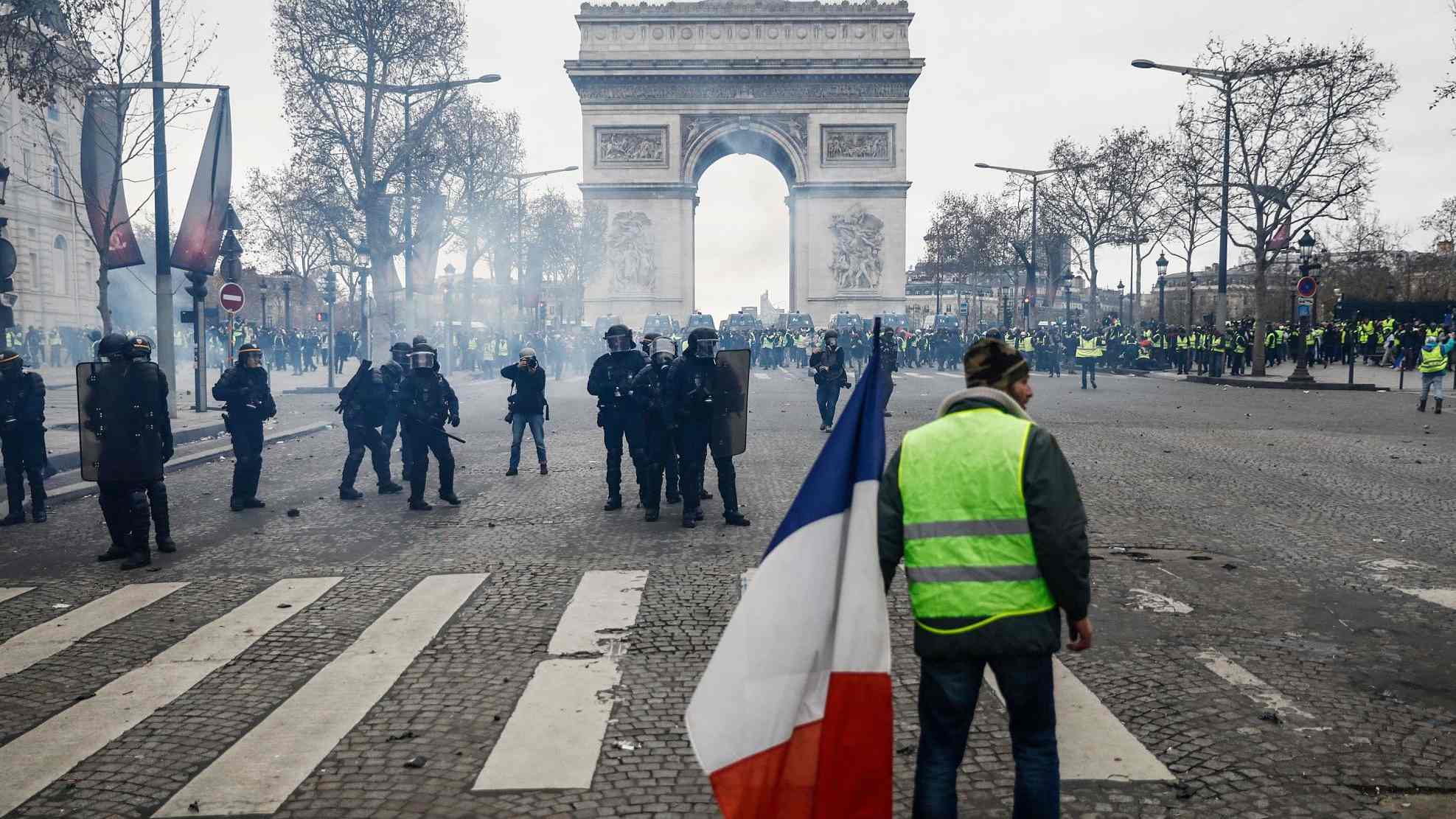Macron promises wage rise, tax cuts in address on 'yellow vest' crisis

Embattled French President Emmanuel Macron Monday announced a series of financial measures, including a 100-euro-per-month increase in the minimum wage from next year, in further concessions meant to defuse weeks of protests that have challenged his authority.
In a 15-minute televised speech from the Elysee Palace, Macron told the nation that he accepted his share of responsibility for the crisis.
The French president struck a more humble tone than usual as he sought to address criticism of his leadership.
Macron stressed, however, that the protests by mostly low-income people in small towns or rural France were the result of long-term problems.
"Their distress doesn't date from yesterday. We have ended up getting used to it," he said. "These are 40 years of malaise that have come to the surface."
Among the measures Macron announced was a 100-euro (113 U.S. dollars) monthly increase in the minimum wage as of next year, for which businesses would not have to foot the bill.
The minimum wage was set at 1,498 euros per month pre-tax in 2018 and 1,185 euros after tax.
Macron's government had previously suggested that any increase in the minimum wage would destroy jobs rather than help create them.
The "Gilets jaunes" protests, which have seen the worst riots in France for decades and taken a heavy financial toll, are the biggest challenge for Macron since he came to power in May 2017.
The centrist president, whose popularity has hit new lows, has been called the "president of the rich" by critics and accused of being out of touch with common people's struggles in provincial France.
'No U-turns'
Macron also announced he would roll back most of an unpopular increase in taxes on pensioners which was introduced by his government.
He called on all businesses "that can afford it" to give employees a one-off "end of year bonus" which would then be tax free.
In another move to appease the protesters' anger, Macron said he would do away with all wage taxes on overtime work.
"We will respond to the economic and social urgency with strong measures, by cutting taxes more rapidly, by keeping our spending under control, but not with U-turns," Macron said.
Earlier on Monday, the French president held four hours of crisis talks with government ministers, parliamentary leaders, business and labor representatives and regional officials.
But in an initial attempt to quell the revolt now in its fourth week, the government agreed last week to cancel a planned increase in anti-pollution fuel taxes.
But the move was seen as too little, too late by the protesters, who held a fourth round of demonstrations on Saturday to press for further concessions on reducing inequality.
Nationwide an estimated 136,000 people turned out for the protests last weekend – the same number as a week earlier. Over 4,500 people have been detained by across France, police said.
Speaking of the violent actions of some of the protesters, who notably set fire to barricades on the Champs-Elysees and defaced the Arc de Triomphe monument, Macron said his government would show no leniency towards troublemakers.
Recent polls by French media showed that public support for the "yellow vests" remained high at more than 70 percent even after the violent riots on December 3, which authorities had blamed anarchists and far-right groups.
What are 'yellow vests' saying
Reactions to his speech from the "yellow vests" were hard to judge as the grassroots movement has no leaders or organizations representing it, and has refused to come under the sway of political parties or trade unions.
Some protesters, interviewed on French television, acknowledged that Macron had made some "concessions," but added that these were "insufficient" to call the protests off.
"This time, there really is some progress. My smile got bigger and bigger as he spoke," said Erwan, one of the movement's "spokesmen" in the northwestern town of Rennes.
But, for Pierre-Gael Laveder, in the eastern town of Montceau-les-Mines, "Macron hasn't taken the full measure of what is going on."
"Every one of his announcements was booed and the first overall reaction was 'he thinks we are fools'," Laveder added.
What it means for French politics
Macron's rivals on both sides of the political spectrum had attempted to profit from the popular anger gripping France but so far without success, as protesters had expressed strong distrust in all politicians.
Right-wing opposition leader Marine Le Pen, Macron's rival in last year's presidential run-off election, welcomed some of the tax measures announced, but accused Macron of being the harbinger of "savage" globalization.
"He refuses to admit it's the (economic) model which he champions which is itself called into question," she added.
Jean-Luc Melenchon, who heads the left-wing opposition Unbowed France, said Macron was mistaken if he thought "a distribution of money" will calm down "the insurrection".
A pro-EU centrist, Macron's victory in the 2017 election was hailed by many as a victory over rising populism across Europe.
The former banker promised to revitalize the French economy with a new style of politics. But that means pushing through hard and often unpopular reforms.
Yet again, Macron's vision of an entrepreneurial France doing more heavy lifting for the EU has become the target of anti-establishment rhetoric. And like all establishments, he's now scrambling to keep the system together.